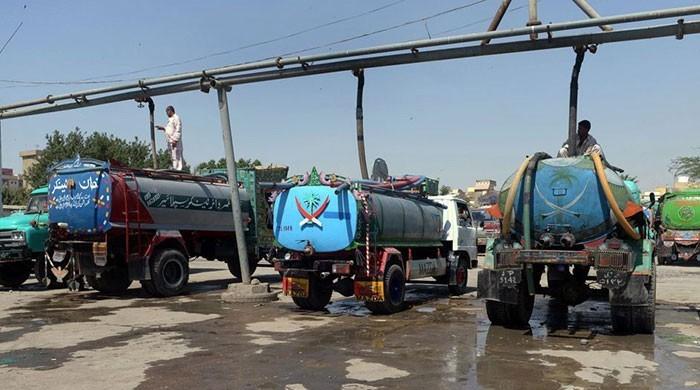Karachi Struggles with Catastrophic Water Crisis as KWSC Launches Urgent Line Repairs
Karachi to Face Another Major Water Crisis as KWSC Starts Line Repair Work
Karachi: The Karachi Water and Sewerage Corporation (KWSC) has announced a significant water shortage in the metropolis due to ongoing repair work on two major supply lines. The city, which typically receives 650 million gallons per day (MGD), will experience a shortfall of approximately 250 MGD, affecting residents across various districts.
Massive Water Shortage Expected Across Karachi
The repair work, which began on Saturday, February 23, 2025, is expected to last 72 hours, impacting the water supply in South, Keamari, West, Korangi, Malir, East, and Central districts. Residents have been advised to store water in advance and use it conservatively.
A spokesperson for KWSC stated that the repair involves fixing leaks in the FTM 48-inch and CTM 54-inch diameter pipelines, crucial components of Karachi’s water supply infrastructure. Despite these repairs, KWSC assures that 400 MGD of water will still be available for distribution.
Areas Affected by Water Shortage
The following areas are expected to experience low to no water supply during the repair period:
- Old City Area
- Shershah
- PAF Base Masroor
- Landhi
- Korangi
- Liaquatabad
- Nazimabad
- Pak Colony
- Gulbahar
- Gulshan-e-Iqbal
- Manzoor Goth
- Peeli Kothi (Liaquatabad)
KWSC Urges Residents to Conserve Water
KWSC officials have urged Karachiites to store water in advance and limit unnecessary consumption to mitigate the impact of the shortage. Managing Director Asadullah Khan has instructed that all leaks in the pipelines be fixed before Ramadan, ensuring a stable water supply for the holy month.
“We understand the inconvenience caused to residents, but these repairs are essential to improve the city’s overall water distribution system,” a KWSC spokesperson stated.
Past Water Crises in Karachi
Karachi has faced multiple water shortages in recent months. The city’s water infrastructure is aging, and leakages in underground pipelines have exacerbated supply issues. A recent crisis on University Road, where an underground mainline leaked twice, led to weeks of water scarcity in the affected areas.
Steps to Cope with the Water Shortage
Residents can take the following measures to minimize inconvenience during the shortage:
- Store Water in Advance: Fill up storage tanks, drums, and containers before the supply reduces.
- Use Water Efficiently: Avoid unnecessary usage such as excessive washing, prolonged showers, and leaking taps.
- Recycle Water: Use wastewater from washing dishes or laundry for cleaning floors or flushing toilets.
- Coordinate with Neighbors: Community sharing can help those without access to stored water.
- Contact KWSC Helpline: For emergency water supply, reach out to KWSC’s complaint centers.
Future Water Management Plans
KWSC has emphasized the need for long-term water infrastructure upgrades to prevent frequent disruptions. Plans are in place to modernize the existing pipeline network and improve water storage facilities across the city.
Additionally, the government is considering alternative water sources, including desalination plants and improved groundwater management, to reduce reliance on a single water distribution system.
Conclusion
With 40% of Karachi’s water supply affected, residents must prepare for three days of reduced access to clean water. Storing water and adopting conservation habits can help alleviate the impact of this crisis.
For further updates on Karachi’s water supply and future developments, check out our latest reports on Karachi’s Water Crisis and Water Management Solutions.







